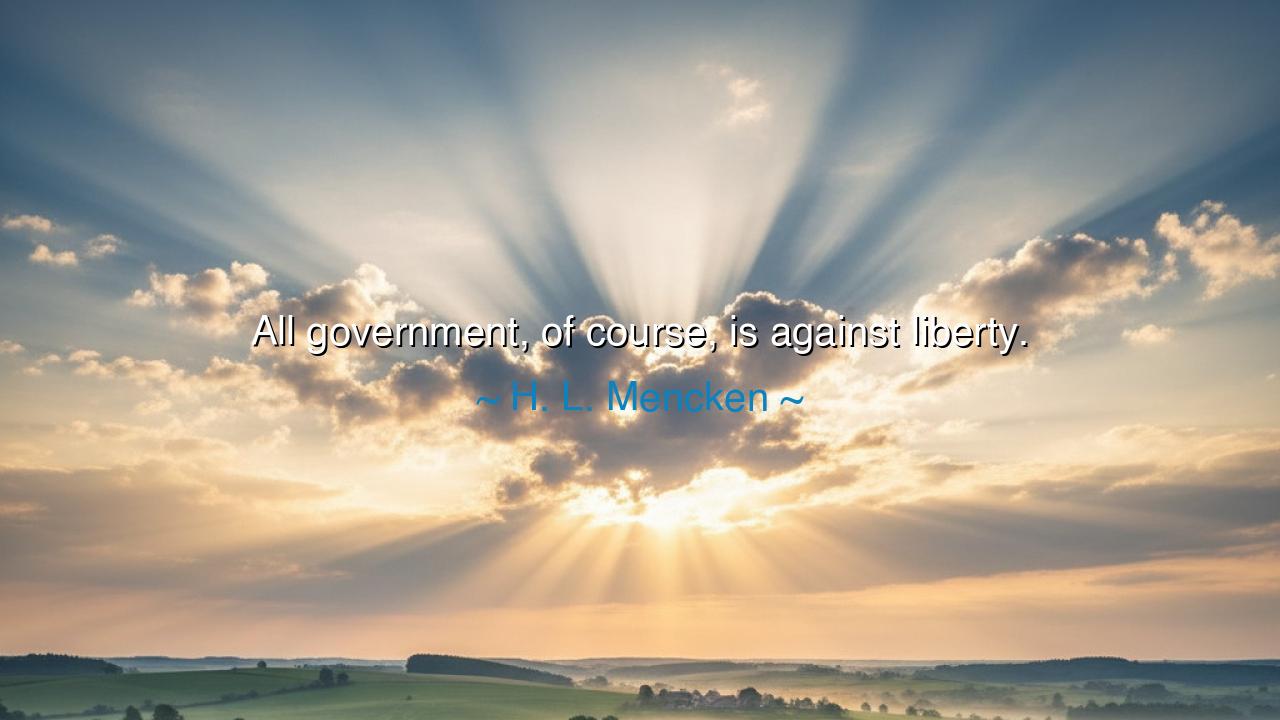
All government, of course, is against liberty.






"All government, of course, is against liberty." — H. L. Mencken
In these cutting and timeless words, H. L. Mencken, the sage and skeptic of the modern age, lays bare a truth that rulers and citizens alike too often forget. When he declares that all government is against liberty, he does not speak from hatred of order, but from a deep understanding of human nature and power. His words are not an argument for chaos, but a warning against complacency — a reminder that the very nature of government is to restrain, to regulate, to command. And wherever authority exists, it seeks to grow. Thus, liberty — that fragile and sacred flame — must be guarded not only from tyrants, but from the slow, creeping hand of control disguised as protection.
Mencken, a fierce journalist and philosopher of the early twentieth century, lived in an age when governments claimed to act in the name of progress, morality, and safety. He saw how easily such noble causes could become masks for power. During the Prohibition era, when the state sought to enforce virtue through law, Mencken ridiculed the hypocrisy of politicians who preached purity while trampling freedom. His eyes were sharp to the irony that government, no matter how democratic, always believes it knows better than the people it serves. Thus his declaration: that the instinct of authority is ever at odds with the instinct of liberty.
This conflict is as old as civilization itself. Since the first tribe crowned its chief, since the first city built its walls, men have traded a measure of freedom for safety. And yet, as the wise have always known, each surrender — however small — invites the next. The philosopher Lao Tzu warned against too much rule, saying, “The more laws and restrictions there are, the poorer the people become.” The Roman statesman Tacitus wrote, “The more corrupt the state, the more numerous the laws.” Mencken’s insight is the echo of these ancient truths — that the natural hunger of government is for control, and only the eternal vigilance of free men can hold it in check.
Consider the rise of the Roman Empire, once born from a proud republic. The Roman people, weary of war and chaos, turned to strong rulers for peace. They surrendered their power, one liberty at a time, until emperors reigned where senators once debated. The people gained order — and lost their souls. Their history is the mirror Mencken holds before us: that even the most enlightened government will, in time, forget that it exists for the governed, and not the other way around. For liberty is not the natural state of government; it is the natural right of the governed, forever in peril of being taken back.
Yet Mencken’s tone, though sharp, is not despairing. He does not say that government must be destroyed, only that it must be distrusted. For distrust is the sentinel of freedom, the guardian that keeps power from swelling beyond its purpose. A good government, he implies, is one constantly restrained by the will of a free and skeptical people. To forget this truth is to awaken one day in servitude, wondering when the chains were clasped. Liberty, he teaches, cannot be delegated; it must be lived, defended, and demanded by every generation anew.
Even in our own time, this warning rings true. Every law passed in the name of safety, every surveillance measure justified by fear, every regulation meant to “help” — each, in its own way, trims the wings of freedom. And though many such acts begin with good intent, the path they pave leads steadily toward dependence. The wise citizen, therefore, does not reject government outright, but holds it ever accountable — knowing that unchecked authority is the natural enemy of the free spirit. Mencken’s words are a mirror for all who would call themselves free: never trade your liberty for comfort, nor your judgment for obedience.
So, O listener, take these words not as rebellion but as counsel. Government, like fire, is useful but dangerous — it warms the home when contained, but burns the world when unrestrained. Honor those who serve justly, but never worship them. Obey laws that preserve order, but question those that erode dignity. For liberty is not a gift bestowed by the state; it is the breath of the soul, and its loss is the slow suffocation of mankind.
Lesson: Government’s nature is to expand, and liberty’s nature is to diminish under its weight. Freedom survives only where the governed are wise enough to guard it, and brave enough to question every power that claims to protect them.
Practical Action: Be vigilant and thoughtful. Study the laws that govern you, and speak against those that overreach. Cherish independence of mind more than comfort of compliance. Teach your children the value of freedom and the cost of silence. For liberty, once surrendered, is rarely regained — and the only true safeguard of the free is the courage of those who refuse to kneel.






AAdministratorAdministrator
Welcome, honored guests. Please leave a comment, we will respond soon